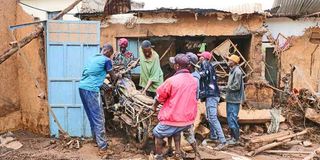Premium
Maai Mahiu learners struggle as schools reopen

A vehicle that was swept by floods in Maai Mahiu on April 29, 2024
What you need to know:
- "They do not have school uniforms and the distance from the rescue centre to their schools is far. They cannot go alone, they will have to stay at home as we figure out how they will go back to school.
- They told us that we cannot transfer them to other schools which has been a challenge to us as parents," says Frida Karemi Munywa.
As students countrywide returned to school for the second term, a stark contrast unfolded in Maai Mahiu where more than 100 learners remained at home, grappling with the aftermath of the flash floods tragedy which killed 61 people in four villages.
For these survivors, the pursuit of education has become a distant dream, overshadowed by the pain of loss and the uncertainty of their future as they remain home.
At the PBB prayers centre, which has been converted into an Internally Displaced Persons (IDP) camp, children were playing in groups as their parents watched from a distance.
Joyce Wanjiru, 24, told Nation.Africa that she hesitates to send her children who survived the floods to school, fearing for their safety amidst ongoing rains.
Her harrowing experience, witnessing her home engulfed by water, still haunts her, making it difficult to let go of her children.
She survived the tragedy with her husband, and two children aged seven and five years, and her younger sister is still traumatised to let her children attend classes.
According to her, well-wishers on Monday donated books, shoes, and bags, but learners were not given school uniforms leaving other parents in limbo.

Men salvage a motorbike from sludge in Mai Mahiu in Naivasha, Nakuru County on April 29, 2024.
" I do not think I will be at peace if I let them go to school. I watched them helplessly as they were being carried by water, but I could not do anything to save them. I am still waiting for my husband to be discharged from the hospital so that we can decide how they will be dropped off and picked up from school. I am almost due to deliver our third-born child," she said.
Similarly, Frida Karemi Munywa's 10-year-old son, now confined to a wheelchair due to severe leg and hand injuries sustained during the tragedy, faces an uncertain educational journey.
The family's challenges are compounded by the logistical hurdles of commuting to school and the lack of essential resources.
Her other two children, a form one student and a grade one pupil, are also still at home as the distance to school from the rescue center is far.
"They do not have school uniforms and the distance from the rescue centre to their schools is far. They cannot go alone, they will have to stay at home as we figure out how they will go back to school. They told us that we cannot transfer them to other schools which has been a challenge to us parents," she said.
Another parent who lost two children in the tragedy is yet to come to terms with their loss and letting the two others, who luckily survived go to school, will traumatise her.
A spot-check at Ngeya Girls Secondary, where survivors were initially housed, revealed that the school has not been reopened yet, while the primary section learning is in progress.
Despite the three weeks ago tragedy, signs of resilience are emerging, small businesses and shops, once shuttered by the disaster, are beginning to reopen, offering a glimmer of hope for the community's economic recovery.
Ms Teresiah Wanjiru who operates a shop a few meters from the scene said that she had to reopen inorder to earn money to cater for her children's school fees.
"I have no other source of income, the matatu we were depending on was carried away by water and needs to be serviced before going back to business. We were lucky to survive but I lost nine neighbours, since then I have been closing my shop earlier as 6pm from the initial time of 9pm," she said.
Separately in Samburu County, hundreds of students in conflict-ridden areas are facing uncertainty as schools grapple with the aftermath of recent bandit attacks.
Schools affected by the wave of banditry include Angata Nanyekie, Nkorika, Lorian, and Soit Pus primary schools, dealing a blow to students, parents, and teachers alike, especially those in junior high school.
The wave of violence has forced the closure of several schools in Samburu West and North, as families flee their homes in search of safety.
The situation remains tense in these areas, with parents expressing concerns about the safety of their children returning to school.
Bandit attacks continue to plague the region, with the latest incident occurring near Lorian Primary School on Monday. In the past week alone, gunmen have targeted travelers along the Maralal-Baragoi road.
"It is difficult to take your child to school in the areas we fled because of safety concerns," said James Lengalen, a concerned parent.
"Gunmen are still all over despite government assurances. We fear sending them to school," he added.
Additional reporting by Geoffrey Ondieki.





